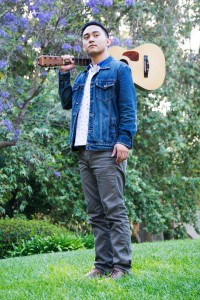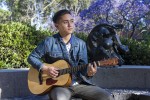Rico Lomarda emerged from his apartment’s closet with a guitar in hand, having finished working on his songs for six hours straight.
The musician’s closet doubles as his studio – the place where he finished recording and producing his four-song debut EP “Love or Something.”
Lomarda, a third-year biochemistry student, performs under the stage name Rico Loma and released his EP “Love or Something” in January. He produced the EP with the student-run record label Landing 8 Records, which he and his five friends created while living in Sproul Landing their first year at UCLA.
Lomarda practices his music in a piano room in the Schoenberg Music Building by day and records in his apartment’s walk-in closet by night.
“When (my roommates and I) saw that there was a walk-in closet, ‘studio’ was the first word that came to our minds,” Lomarda said.
[Related: Student musician captures momentary emotions with R&B, verse]
Located on Gayley Avenue, the Westwood Palm apartment closet ceiling is covered in a thick blanket. Below it, a sliding curtain hangs down as a makeshift door, and layers of the boys’ daily jackets and T-shirts line the walls, helping to soundproof the small room.
When Lomarda recorded his vocals for his EP, he shared the closet with a microphone, a mic stand and a vocal shield. His roommate and co-producer Nicholas Henry sat in the bedroom with a laptop and a wire to connect all the equipment.
Henry, a third-year ethnomusicology student, and Lomarda have held jam sessions in Schoenberg’s piano room together since their first year together at UCLA.
Lomarda worked on the lyrics and the central melodies of his songs while Henry produced the harmonies, Henry said. They then recorded Lomarda’s vocals and produced the instrumentation with Pro Tools – all in their closet-turned-recording studio.
Lomarda’s main artistic influences include Bruno Mars, Sam Smith and Ed Sheeran. The EP’s first song “Breathe” is upbeat and groovy, reflecting some of Bruno Mars’ musical style, Lomarda said.
“All the songs are about transparency and being real with each other,” Lomarda said. “Communication solves a lot of things.”
Another song, “I’m Right Here,” has become a fan favorite from the EP, Lomarda said. The acoustic ballad provides a social commentary on the cheesy simplicity of love conveyed in contemporary pop culture. Lomarda wanted to capture the reality of love in his EP’s songs, something he said is not always so simple and grand. His thinking was shaped by his own experiences with love and from movies like “500 Days of Summer” in which the protagonist takes on an unhealthy mindset in pursuing a lover who doesn’t return the same amount of care, he said.
“I don’t want to give the false idea about love that many movies and music portray,” Lomarda said. “I want my music to be multidimensional, always with a sad twist in them.”
[Related: Brothers plug students into music industry through sessions with artists]
When lyrics occur to him, Lomarda writes them down between classes in Google Docs, categorized in about 100 documents – some with complete songs and others with just a lyric or two – in a digital folder.

“I treat my folder like a diary – when I feel a certain emotion, I write it down,” Lomarda said.
Lomarda also remembers where on campus he wrote the lyrics, causing him to feel attached to specific locations, he said. In front of the Luskin School of Public Affairs building, he wrote “You say, oh how I wish there was someone for me, and it fools me/ how you chase something that won’t follow” – the first verse to his song “I’m Right Here.”
As for the melodies of the songs, he said they just pop up in his head, and if they come up again the next day, he uses them in a song because he knows they were catchy. Lomarda also composes melodies with a piano, which he finds highly therapeutic, he said.
Lomarda’s second roommate Jose Cibrian serves as Lomarda’s artist and repertoire manager. Cibrian, a third-year political science student, said the closet studio has been beneficial for Lomarda’s music by giving him more flexibility and determination to work on music.
“Having the flexibility to record whenever he wants to is a big help because it never stops or limits creativity which would happen if we booked studio time,” Cibrian said. “You work with what is available to you and you make the best of it, and that’s when you know how much an artist really wants it.”
All four songs on Lomarda’s EP reflect the experimental nature of his closet studio – they all differ from each other in musical style. He is working on an acoustic version of his EP to paint a more lucid picture of his own musical style.
“I’m turning the corner, and I’m on my way there,” Lomarda said. “Before, (my musical style) was all over the place, but the image is becoming more and more clear now.”
